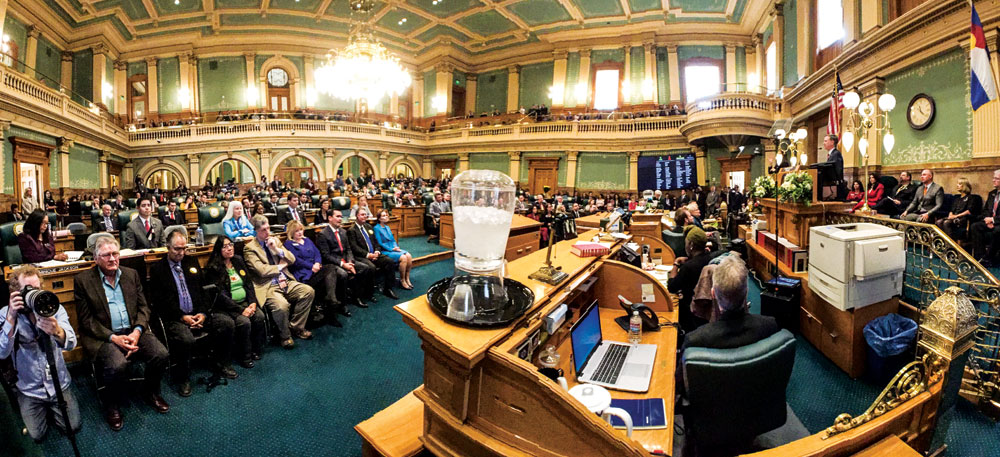
The Colorado House and Senate gather in the house chamber to hear Governor Hickenlooper’s state of the state speech.
The list of problems facing the Colorado Legislature has a familiar ring: school finance, roadway gridlock, and a state budget contorted and constrained by conflicting amendments to the state constitution. But under the golden dome of our state Capitol, there’s an unmistakable air of optimism. Some of it results, ironically, from the transition to a new federal administration and the promised changes to the Affordable Care Act (ACA). Threats to cherished programs galvanize and energize the opposition. For legislative newcomers like Rep. Chris Hansen, the threat represents an opportunity: “I am very optimistic that conditions have evolved from two years ago. Now, there’s no stalling until the next election.”
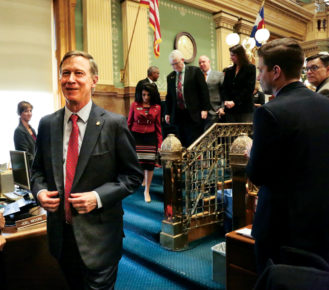
Governor John Hickenlooper leaves the podium after making his State of the State address to the combined house and senate in the house chamber.
Hansen believes a long season of rhetoric has passed, and the time has come for legislators nationally and locally to grapple with the reality of budget limits and major policy shifts. For legislative veterans like Sen. Angela Williams, the focus is on what the General Assembly can do to craft “common sense solutions we face in this state because we just don’t know what is going to occur in Washington.”
In Colorado, some measure of the newfound optimism can be attributed to the refresh caused by turnover. In the 100-seat General Assembly, a total of 8 senators and 17 representatives are new—one-quarter of the total.
All five state legislators in the Front Porch distribution area are new to their seats. Former state representatives Lois Court and Angela Williams have moved over to the Senate in districts 31 and 33, respectively. All three area representatives are new to the legislature: James Coleman in District 7, Leslie Herod in District 8 and Chris Hansen in District 6. The representatives are also distinguished by their youth at an average age of 34. Coleman, at 29, is the youngest state legislator while Herod, 33, is the first “African-American, female LGBT person to take an elected seat in Colorado.”
Coleman and Herod are especially proud to be part of the largest-ever class of African-American state legislators: eight total including Rhonda Fields (Senate District 29), and state representatives Thomas “Tony” Exum Sr. (District 17), Janet Buckner (District 40), Jovan Melton (District 41) and Dominique Jackson (District 42).
Despite all these changes, the partisan makeup of the state legislature is little changed from last year. Control of state government remains split with the Republicans maintaining a one-vote Senate majority (18-17) and the Democrats increasing their House majority by three seats (37-28).
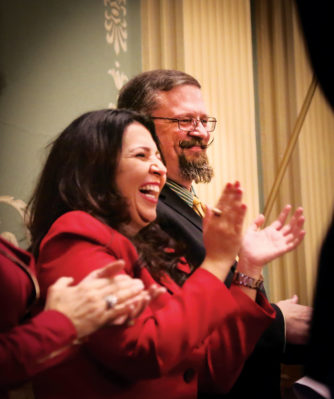
Speaker of the House Crisanta Duran (D) and Senate President Kevin Grantham (R) applaud after the governor’s speech.
Democrat John Hickenlooper remains governor but with this being his penultimate year in that office, he seems to have drawn a firmer line with the Republicans. In his Jan. 12 state of the state address, he challenged the Republicans to specify the cuts they would make in existing programs if they joined in his commitment to increase spending for infrastructure, especially for transportation. Hickenlooper’s budget includes $500 million in cuts to ensure that the state remains within the budgetary caps imposed by the 1992 Taxpayer Bill of Rights (TABOR) amendment to the state constitution. The governor requested for the third session in a row that legislators free up some funding for transportation by classifying the state-imposed hospital provider fee as an enterprise fund (sometimes referred to as the HPF conversion). That would create some $700 million of spending capacity under the state’s revenue cap before it is required to give tax refunds.
“We’ve had this debate for too long. If talk could fill potholes, we’d have the best roads in the country,” Hickenlooper said. “But the general fund cannot adequately support the demands of core government services and capacity improvements in transportation.”
The partisan divide was most clearly reflected when Hickenlooper said he would fight for a replacement plan to the Affordable Care Act. While Democrats stood and applauded his defense of the ACA, Republican legislators sat quietly, many with folded arms and stern expressions.
NE Legislators in Consensus on These Issues:
For its part, the legislative delegation for Northeast Denver stands united in its support of the governor’s stance on health care. Interviews with the legislators in the first week of the new session revealed a consensus on other issues as well:
Construction Defects
After years of wrangling and state inaction, there appears to be bipartisan support for legislation that would increase the supply of condominiums.
Transportation Funding
The consensus pertains to perceived need—that increased funding through a statewide bond issue is needed to address existing maintenance and capital construction needs and to accommodate Colorado’s continued population growth. Democrats point to the hospital provider fee as one way to free up more funding. Republicans want to squeeze dollars for highways out of existing revenue sources.
Education Funding
The terms of this debate are similar to those addressing transportation with Democrats supporting the HPF conversion as one way to generate more funds for schools.
Priorities for individual Legislators
Rep. Coleman

Rep James Coleman, House District 7
He says he will introduce a bill to provide additional resources for the law enforcement community including mental health support through embedding co-responders during interactions between law enforcement and community. A separate bill would provide teachers with “cultural development training to address the preschool through 3rd grade suspension epidemic.” He will also be developing a proposal supporting “worker cooperatives” in which employees as a group could purchase a business from a willing employer to save jobs and sustain small businesses. The bill will include financial incentives to promote such business ownership models.
Rep. Hansen
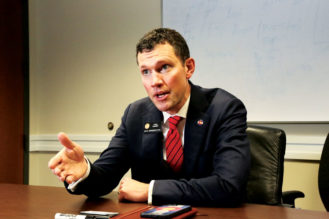
Rep. Chris Hansen, House District 6
Befitting his background in energy economics, the first three bills Hansen plans to introduce would accelerate integration of renewables in the grid, promote electrical grid transmission line interconnection, and address the impacts of plant closures on the host community. Despite that personal focus, Hansen says education financing will be the hot topic in the current session. Regarding TABOR, he is encouraged that a pair of Republicans has indicated openness to addressing that amendment’s formula for tying state budget growth to the consumer price index of inflation. He is wary of linking the formula to growth in personal income, as two Republican legislators have suggested, since inflation factors for the state, such as labor and asphalt, track more closely with state expenditures than personal income. Hansen notes that he, along with Rep. Herod, have become plaintiffs in a long-running suit to declare TABOR unconstitutional.
Rep. Herod
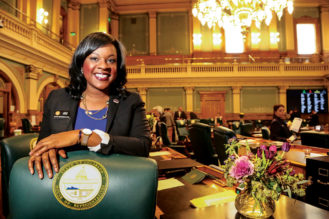
Rep. Leslie Herod, House District 8
On her campaign website, Herod organizes the issues she cares about on the theme of “community” (safe, shared, engaged, etc.). In that vein, she says she is excited to offer as her first bill a “checkoff for homeless youth-serving agencies.” This would be a checkoff box on state income tax forms allowing voluntary contributions to selected charities. She hopes it raises several hundred thousand dollars, resulting in shelters and “wrap-around” services for homeless youth. She joins in the Democrats’ support of the HPF conversion. Much of her agenda is, she acknowledges, defensive in the face of a new administration that she fears might weaken protections for certain classes of people such as immigrants, people of color and from the LGBT community.
Sen. Court
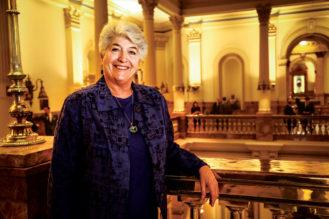
Senator Lois Court, Senate District 31
Hansen’s House District 6 predecessor moves to the Senate District 31 formerly held by Pat Steadman who was term-limited. She acknowledges the challenge of working in a chamber controlled by the other party but asserts it’s not a big change “because 85 percent of what we do is bipartisan.” She wants to push a bill increasing fines for texting while driving. She also wants to explore ways to protect citizen-initiated statutes approved through voter petitions on the ballot. She is considering creating a time-out period or a super-majority vote requirement before the General Assembly can alter the citizen-approved statutory legislation.
Two other factors appear to be limiting the range of legislation she will be proposing: first, she would prefer not to “tweak” TABOR but instead seek something longer-lasting such as a 10-year timeout if not permanent relief from the requirement to give back funds exceeding the artificial limit that TABOR creates; second, voter approval of cherished measures such as the medical-aid-in-dying legislation (Proposition 106) means some of her attention will focus on ensuring that administrative regulations carry out the intent of the proposition. She will provide similar oversight to implementation legislation related to last fall’s Amendment 71 that “raised the bar” on efforts to amend the constitution so the Secretary of State will have the statutory authority to review signatures gathered in the way the constitution now requires.
Sen. Williams
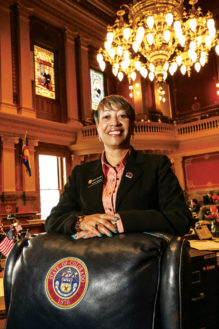
Sen. Angela Williams, Senate District 33
She has co-sponsored Senate Bill 45, legislation she hopes will help insurance companies accurately underwrite policies for multifamily condominium projects by allocating among subcontractors and the general contractor the cost of defending a construction defects claim. The goal is to lower insurance costs and bring down the cost of condominiums to provide would-be homeowners another option for entering the housing market. A second high-priority bill would require that women be given a breast tissue density notification in conjunction with mammography results. Dense breast tissue can mask the presence of cancer. This bill could help a doctor and patient make more informed decisions about the necessity of additional screenings. As with Sen. Court, Williams will introduce a bill to help implement prior legislation, last year’s SB-197 that changed the system for regulating the retail sales of alcoholic beverages. She also plans on submitting a bill to “rebuild trust between community and police version 3.0.”
Williams supports the replacement of the I-70 viaduct in the Elyria-Swansea neighborhood but is “very concerned that community voices are not being heard.” She said the Central 70 project will “disrupt the community, impacting low-income people of color.”
Finally, to improve communication between her office and the larger senatorial district she now represents, Williams is forming a community advisory cabinet—interested residents of her district should contact her at Sen.Williams.SD33@gmail.com, or 303-866-4864.
A map of the three house and two senate districts within the Front Porch distribution area is posted with this article at FrontPorchStapleton.com




0 Comments